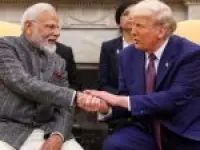
How Indian Opinion Makers Shared Observation On PM Modi's Authority And Governance? (image:x.com/narendramodi/)
In recent articles, India’s two veteran journalists, Vir Sanghvi and Pratap Bhanu Mehta shared their observation on the current state of BJP as a part, PM Modi’s authority and governance, and what people are thinking about the third Modi-led BJP government at the Centre.
In his article on Print titled, “Nobody knows what Narendra Modi is thinking. Surely, he must sense the tide is turning,” Sanghvi argued that among the Modi supporters, the middle class is mostly disappointed during and after election. Though they support BJP’s Hindutva project, they are not in approval of the communal angle. Hence, when they support BJP, educated middle class was thinking about better prospects, but witnessing last general election campaigns they have touched disillusionment, Sanghvi said. Most of the campaign speeches were on attack mode and with communal subtext. “Not only was the Congress going to snatch the mangalsutras off the necks of Hindu women and confiscate the buffaloes of poor farmers, all of these were then going to be given to Muslims,” he writes.
Also Read | “Let The Exploitation Stop Here”: Khushbu On Hema Commission Report
Earlier times, these communal-toned messages would have generated an impact, but currently the educated middle class is hoping for messages addressing better days. Even after election also, PM Modi does not view BJP-supporting middle-class as their core constituency, Sanghvi adds. The Budget failed to offer anything for the middle class; “since then, the government has continued to act as though the middle class does not matter; only its fat-cat pals do,” he writes.
The disillusionment pose the middle-class to look critically at the government’s performance. People ask about the derailing of trains, cracking of new roads and bridges, collapse of expensive new statues, relation with neighbouring countries, and misuse of central agencies to serve political ends. “Judges who have uncritically accepted the government line now face more scrutiny,” Singhvi states. Rather than answering their concerns seriously, the major agenda of the party, particularly, BJP IT cell is to “attack,” with tone of the posts extending on “uniformly accusatory and negative”.
As the disappointments are on the rise, the critical question remains, “what is the Prime Minister thinking?” Singh assumes that he must also sensed that “the tide is turning.”
Meanwhile, Pratap Bhanu Mehta, in his article on an Indian Express writes about “A new governance matrix”. The matrix has emerged following the election results and discussed its elements in detail in the article. “The most important element is the collapsing authority of the prime minister,” he wrote. Citing the increasing weakness of the Prime Minister, Mehta says that there is a “sense of vacuum at the top”. “He is saddled with his own weaknesses and inner demons, not the constraints of coalition partners or any potential challengers.”
The second element of the matrix is that the government will increasingly take recourse to a “grammar of anarchy”. The party has disgraceful record on respecting institutions, he states. “First, in the states where the BJP is not in power, it will continue to have an investment in using its institutional power to precipitate confrontation,” Mehta writes. The setback in the electoral battle have not decreased the “BJP’s appetite for communalism”; it in fact led to a greater investment in the Hindutva project, he ascertains.
Also Read | Kolkata Rape-Murder: Congress’ Pawan Khera Urges President Droupadi Murmu To Look Beyond Party Politics
What India needs most is what might be called the radicalism of routine governance, Mehta observes. “The absence hinders India’s growth potential, and mission mode schemes cannot compensate for its absence. But routine governance does not provide a basis for mass mobilisation or electoral coalitions. So, you are left with just two instruments-welfare populism and ethnic mobilisation. The BJP will opt for both,” he adds.
The main driver of the new governance matrix is BJP itself – a combination of a prime minister who seems increasingly out of sorts, a governing style that is deepening institutional confrontation, and a civil society rhetoric that is still drawn towards political communalism. “These three elements make the BJP weaker as a governing force even more than the numbers imply,” he adds.













